1860-1989 at the Guggenheim.
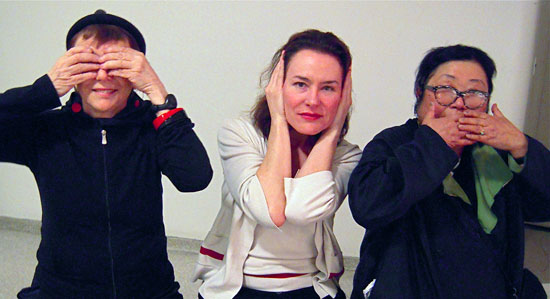
Performance by Mary Beth Edelson, Jessica Higgins and Shigeko Kubota at the
Guggenheim preview reception for The Third Mind: American Artists Contemplate Asia,
1860- 1989, (AKA the Buddha show)
Guggenheim preview reception for The Third Mind: American Artists Contemplate Asia,
1860- 1989, (AKA the Buddha show)
By intermedia artist Jessica Higgins
I was invited by Alison Knowles, to the formal dinner on January 28th and cocktails on the 29th.
Of course I was thrilled to go, not only because the topic was of personal interest to me and to my own conceptual language, but I also felt honored to see so many of the faces I’d grown up seeing and relating to together or close by in the Guggenheim. The curator had a cozy alcove set aside for The Fluxus group of which I so fondly grew up experiencing around me in a childhood wildness to which I often refer now. The scope of the show is vast and brilliant, so for the purpose of expressing my views experientially I will contain them within that room and a few steps upward toward Larry Miller’s work.
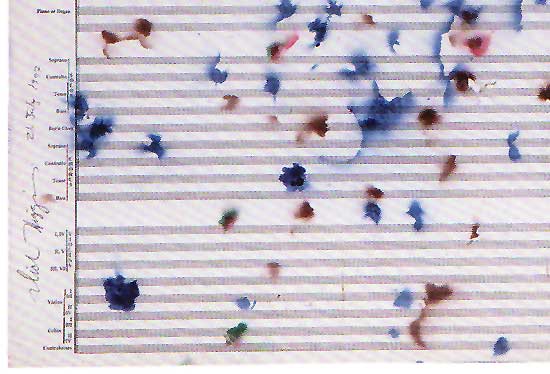
Dick Higgins, A Thousand Symphonies, Performance relic of Danger Music #12,
Symphony #860 1967/97 in Three movements.
Symphony #860 1967/97 in Three movements.
In turning the corner, Dick Higgins, A Thousand Symphonies, Performance relic of Danger Music #12, Symphony #860 1967/97 in Three movements. The bullet holes reflecting a thought of war or questions on its opposite, such a random period in my life in Vermont. A period of harsh screams, pianos and typewriters somehow abstracted into something else, my father always seemed bigger or slightly abstracted by life itself.
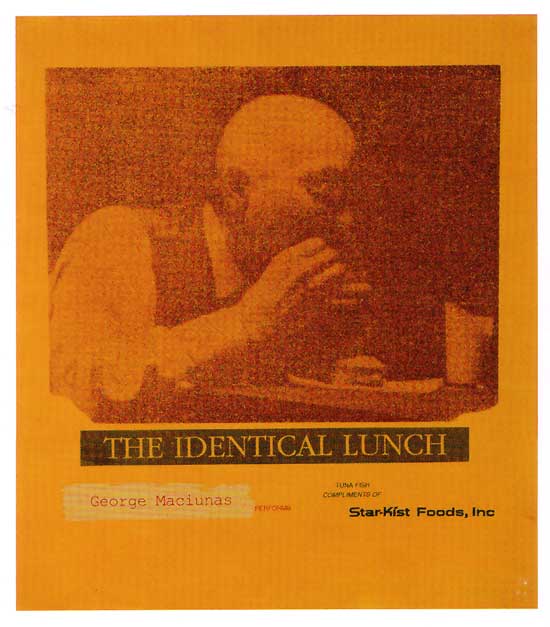
Alison Knowles, The Identical Lunch [2nd Edition], 1973/93 silk-screens in cadmium
Close by Alison Knowles, The Identical Lunch [2nd Edition], 1973/93 silk-screens in cadmium yellow with her friends eating the tuna fish on whole wheat toast with buttermilk brought me back to such a different time. One when artists helped each other and a creative community bloomed. I find myself contemplating Joshua Selman’s amazing grip on culture in the 21st century and his extensive work on ArtistOrganzedArt.org. I flip back in time to the crazy reflections of parties with genital cakes, jelly’s and gender switched wedding’s occurring mostly in big open spaces. All those beautiful faces with concepts behind each one ready to share freely and laugh. Shigeko’s silkscreen reminded me of a full moon. Later I met her sitting like a Buddha and she was smiling, which I hadn’t seen in a while. I was introduced to Mary Beth Edelson, and in a spontaneous way we all made an event. “The quirky, abstracted, pull it together” sense re-merged in a flashback.
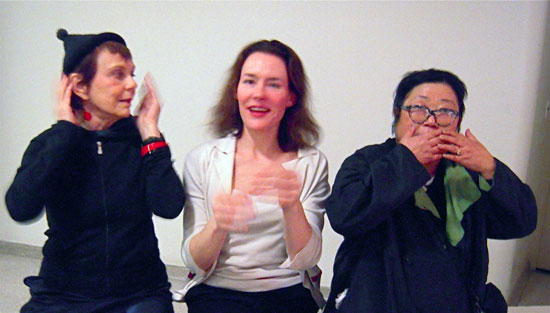
Performance by Mary Beth Edelson, Jessica Higgins and Shigeko Kubota
at the Guggenheim preview reception for The Third Mind: American Artists Contemplate Asia,
1860- 1989, (AKA the Buddha show).Alison Knowles is handed Edelson’s
camera to record the spontaneous performative event.
Performance concept by Mary Beth Edelson, 2009.
In my brief wander upward Larry Miller’s piece about his mother strongly stood out as a relation to the Fluxus room, for me one of the most important later Fluxus artists to exchange and influence the next generation of artists who ponder the movement. He stood by his work talking as only he can about all that went into the work or the people who happened to be there, an event itself. The rambling wild thoughts became a trip about hypnosis, identity and Jack Kerouac who he happened to be reading when he made the piece.
I walked back into the room and found myself drawn to the wonderful typography of Fluxus. The bold black lines and design that often draws me in and did as a child, all those boxes I associate with Maciunas and Brecht. I remember trying to sort through my own toys and being particularly fascinated by toys that came in boxes with pieces.
It was important for me to see George Brecht’s Water Yam, 1963 and Fluxus Internationale Festspiele Neuester Music. Several times during my childhood and very early adulthood I visited George Brecht. The few times I met him he had such charm with such fierce ideas. One intriguing visit took place in Koln at a large dinner with Alison Knowles, myself, her travel companion, Hermann Braun and several others who had joined us. At a large bistro specialized in types of beer, a large tub arrived at the table out of which emerged the enormous head of a roasted pig with hoofs and tail decorating the rim. The body was simply missing. The pig’s head was cooked and shiny, looking like it might open an eye. As the evening went by there were many rounds of Kilsch required to go with stories of friends and we talked about how it was for me working with Alison at the WDR Radio station in Koln. The laughter, smoke and faces are still etched in my memory. Alison Knowles, my mother, invited me the following day on a trip to the Cathedral, it reminded me of a lighted sand castle as we climbed arduously to the top. Decades later on return I still associated Koln with Kilsch, lighted castles and WDR Horspiels and remember the climb standing in the Guggenheim.
Being at The Third Mind also brings me back to John Cage’s visits with my mother and the process of everyday life and everyday art. I saw so much of that in both of them. The outlines of life, the questions and experiences of life art, nature, food and the outlines of John’s smile … the thought of trying one of their mushrooms with concern as they looked them up in a big book … gentle giants … I wasn’t so sure I should try them, but they smelled good and the names were so beautiful … and John had co-founded the New York Mycological Society.
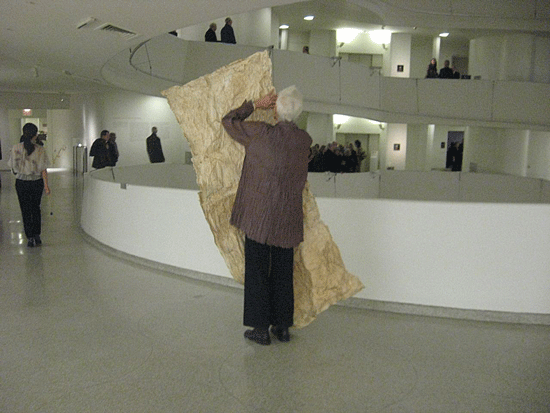
Alison Knowles, The Giant Bean Turner, 1995
Alison would later emerge from the swaying architecture carrying the beans in a way I can only begin to say how much I associate a large part of my early adolescence with constant thoughts about beans, whether in soup or in art the point was consistently pondered. She walked with her statuesque gait and appeared and disappeared being with the art she moved through her event. Somehow it had the extra-ordinary appeal of the ordinary with in it. She was just walking down the path.
I could go on reminiscing about many of the others works in this show and the amazing culture and people I was lucky enough to meet that evening. But I will save that for another time and hope this vignette offers a view of experience reflected back into the eyes of a grown child of art who later became an artist herself.
Jessica Higgins